Books
Books
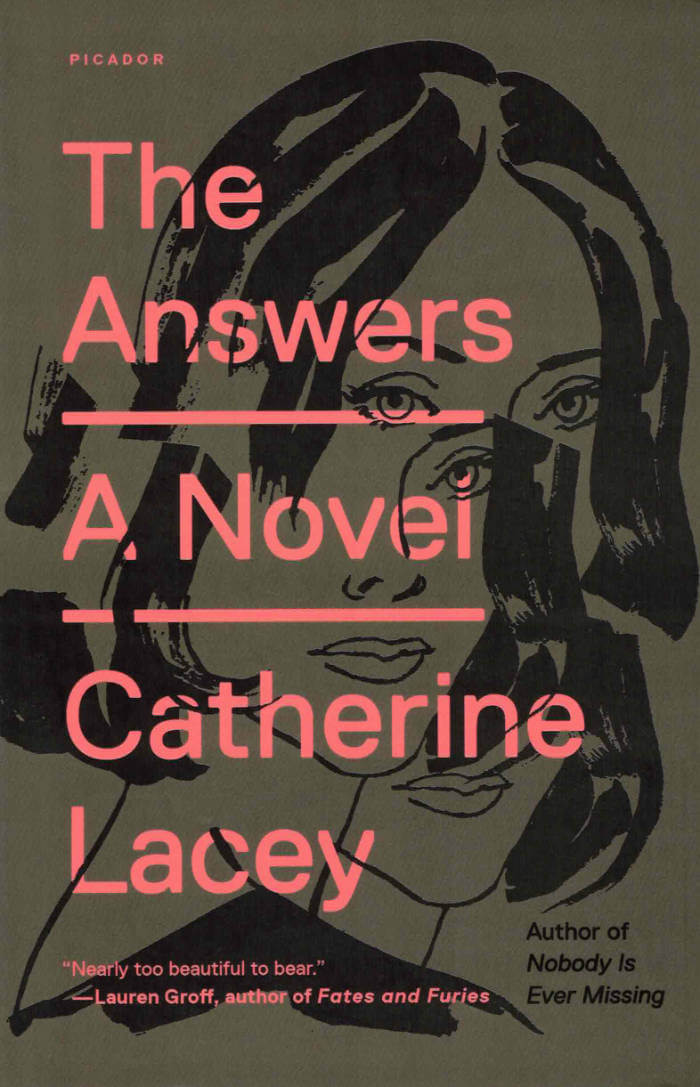
The Answers
An urgent, propulsive novel about a woman learning to negotiate her ailment and its various aftereffects via the simulacrum of a perfect romantic relationship.
In Catherine Lacey’s ambitious second novel we are introduced to Mary, a young woman living in New York City and struggling to cope with a body that has betrayed her. All but paralyzed with pain, Mary seeks relief from a New Agey treatment called Pneuma Adaptive Kinesthesia, PAKing for short. And, remarkably, it works. But PAKing is prohibitively expensive and Mary is dead broke. So she scours Craigslist for fast-cash jobs and finds herself applying for the “Girlfriend Experiment,” the brainchild of an eccentric actor, Kurt Sky, who is determined to find the perfect relationship—even if that means paying different women to fulfill distinctive roles. Mary is hired as the “Emotional Girlfriend”—certainly better than the “Anger Girlfriend” or the “Maternal Girlfriend”—and is pulled into Kurt’s ego-driven and messy attempt at human connection.
Told in her signature spiraling prose, The Answers is full of the singular yet universal insights readers have come to expect from Lacey. It is a gorgeous hybrid of the plot- and the idea-driven novel that will leave you reeling.

Censored Tee
T-shirt collector imprimé en sérigraphie “LA LUTTE COMMENCE DANS L’IMAGINAIRE” au dos et le logo CENSORED devant. Manche longues noir.
Tailles X et XL disponibles.
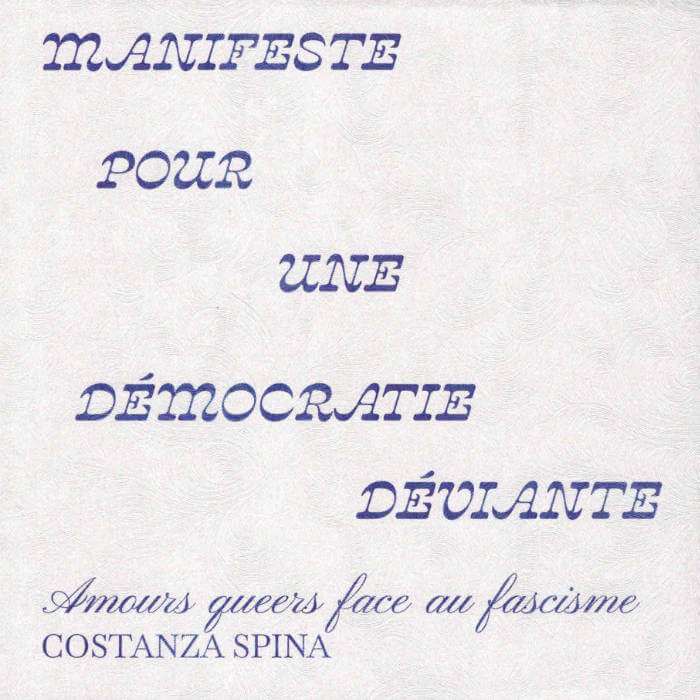
MANIFESTE POUR UNE DÉMOCRATIE DÉVIANTE - AMOURS QUEERS FACE AU FASCISME
Là où le fascisme estime que seules certaines vies sont dignes d’être vécues, la pensée queer et féministe nous enseigne que toutes les vies comptent. Dans cet essai politique incarné et sensible, Costanza Spina démontre que les démocraties capitalistes n’ont jamais réellement repensé leur filiation avec les régimes autoritaires, et comment les « déviant·es » dans l’ombre de systèmes productivistes et violents ont appris à s’aimer, à prendre soin, à rendre justice autrement. Donnant des pistes à la fois théoriques et pratiques pour faire face au fascisme, Costanza Spina théorise la révolution romantique queer comme une lutte radicale, et met au défi de se réinventer par les imaginaires révolutionnaires de l’amour.
« Ce livre s’adresse à celles et ceux qui ne regardent pas les ruines avec rage et nostalgie, mais comme de sublimes terrains de fantaisies et de récits magiques, où se rencontrent monstres et guerrier·ère·s, dieux et déesses gardien·ne·s de mystères obsédants. »
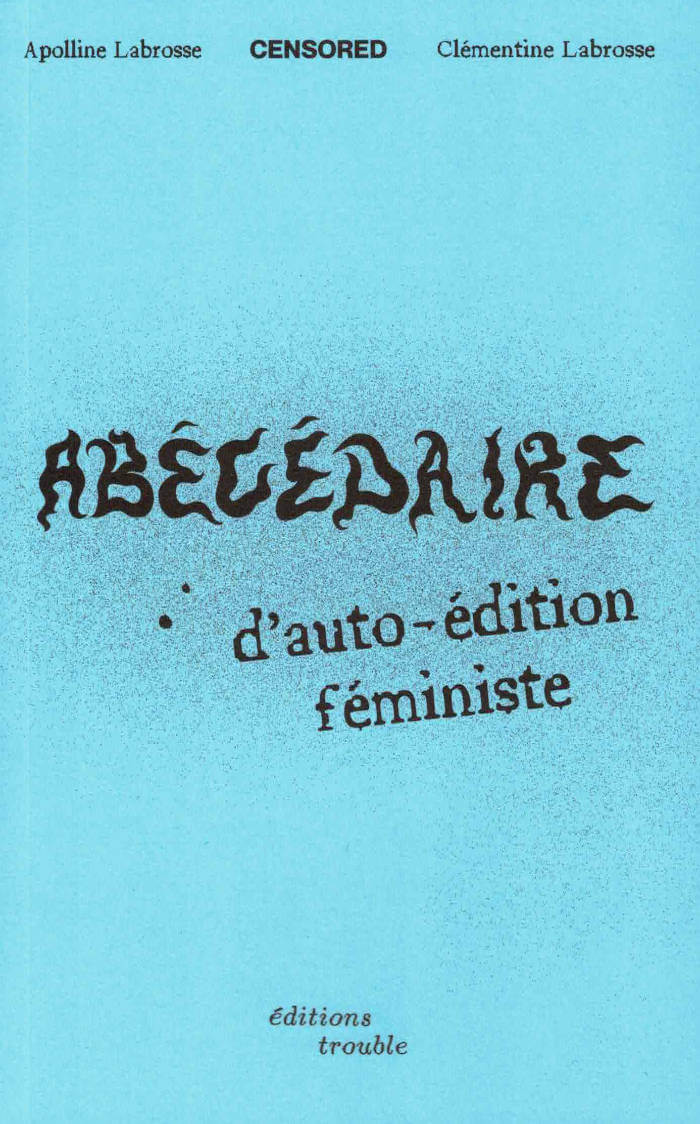
Abécédaire d’auto-édtion féministe
Combien rêvent de créer leur propre magazine ? Comment s’y prendre ? Pensé comme un guide, ce livre rassemble des outils, techniques, ressources, conseils et idées pour qui voudrait se lancer dans l’auto-édition ou l’édition. Révolutions éditoriales, graphiques et artistiques - il questionne en même temps l’existence d’une pratique féministe de l’imprimé autonome. Un abécédaire subjectif, joyeux et non exhaustif imaginé par les fondatrices autodidactes de la revue Censored - issu de leurs expériences et de leurs rencontres.
L’objectif de ce livre est de divulger et transmettre la méthode employée par Apolline et Clémentine Labrosse pour publier Censored, de la maquette Indesign à la promotion, en passant par l’organisation interne. Accessibilité, budget, droits, écriture inclusive, La Poste, graphisme, obligations légales… Au total, plus de 60 mots pour transmettre leur vision, hacks et autres stratagèmes. Ce livre est le fruit d’un constat : alors que nous sommes nombreuxses à voir dans l’imprimé un pouvoir révolutionnaire et un terrain d’expression créative et de lutte - difficile d’obtenir des informations pour apprendre à créer un zine, une revue soi-même, à diffuser massivement ou localement. L’édition ne se contente pas de délivrer une recette concrète, mais présente également des observations et réflexions après cinq années d’exploration des nombreuses stratégies visant à amplifier les voix en marge et à transformer les imaginaires : du mouvement des riot grrrls à la création de structures plus officielles.
Ce livre est le deuxième publié aux éditions trouble. Il a été relu et amélioré par Isabella Utria Mago, Elvire Duvelle-Charles et Maria Tasso.

Switched On – The Dawn of Electronic Sound by Latin American Women
Luis Alvarado, Alejandra Cárdenas
The first book dedicated exclusively to the female protagonists of Latin American electronic music.
The book has been edited by independent curator, researcher and label head of Buh Records, Luis Alvarado, and experimental musician, multimedia artist and researcher Alejandra Cárdenas (also known as Ale Hop).
Composers and sound artists featured in this historical account include: Alicia Urreta, Beatriz Ferreyra, Elsa Justel, Eulalia Bernard, Graciela Castillo, Hilda Dianda, Ileana Pérez Velázquez, Irina Escalante Chernova, Iris Sangüesa, Jacqueline Nova, Jocy de Oliveira, Leni Alexander, Margarita Paksa, Marietta Veulens, Mónica O'Reilly Viamontes, Nelly Moretto, Oksana Linde, Patricia Belli, Renée Pietrafesa Bonnet, Rocío Sanz Quirós, Teresa Burga, Vania Dantas Leite, among others.
The official history of 20th-century avant-garde electronic music has been predominantly narrated from the point of view of Anglo-American and Western European experiences and largely remained focused on its male protagonists. To destabilize this history, this editorial project presents a collection of perspectives, essays, interviews, archival photos, and work reviews centered on the early electronic music production by Latin American female creators, who were active from the 1960s to the 1980s. The book also brings us closer to the work of a new generation of researchers who have focused on offering a non-canonical reading of the history of music and technology in Latin America. The publication is the record of a new vision, an account of the condition of being a woman in the field of music technology at a time when this was a predominantly masculine domain. The decision to take electronic technologies for sound creation as the backbone of this history is related to the intention of broadening our focus of interest outside the spectrum of institutional electroacoustic music to include other experimental, interdisciplinary and sonic arts practices involving new technologies, beyond the circuits of academic avant-garde music.
The texts that make up this publication are organized spatially and conceptually, rather than following a chronology. The selection of female composers profiled sheds light on a variety of relevant aspects: key musical contexts, experiments with technologies (such as tape, electronic synthesis, the first commercial synthesizers), diverse formats (i.e., radio art, electroacoustic pieces, installation, multimedia, theater, film, etc.), intertwined with themes, such as migration, memory, identity, collaboration, interdisciplinarity, social engagement, the acceptance of electronic music, etc. Moreover, the framework of this editorial project opened a space for intergenerational dialogue and a meeting of aesthetics, as many of the authors gathered as collaborators are composers and sound artists themselves.
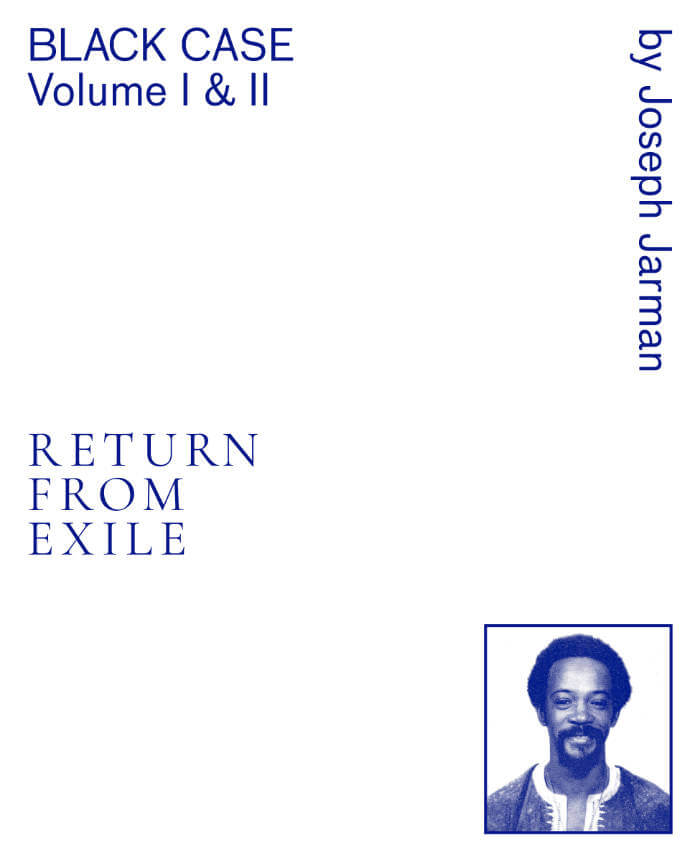
Black Case Volume I and II – Return From Exile
The republication in print form of the poems of Art Ensemble of Chicago's founding member breathes new life into a forgotten document of the Black Arts Movement.
In 1977, Art Ensemble of Chicago Publishing Co. published Jarman's Black Case Volume I and II: Return From Exile, a collection of writing conceived across America and Europe between 1960 and 1975. Comprised largely of Jarman's flowing, fiery free verse—influenced by Amus Mor, Henry Dumas, Thulani Davis, and Amiri Baraka—the book also features a manifesto for “GREAT BLACK MUSIC,” notated songs, concert program notes, Jarman's photos, and impressions of a play by Muhal Richard Abrams, the founder of the Association for the Advancement of Creative Musicians of which Jarman was also an original member.
Jarman writes poetry of personal revolutionary intent, aimed at routing his audience's consciousness towards growth and communication. He speaks with compassionate urgency of the struggles of growing up on Chicago's South Side, of racist police brutality and profound urban alienation, and of the responsibility he feels as a creative artist to nurture beauty and community through the heliocentric music that he considers the healing force of the universe. A practicing Buddhist and proponent of Aikido since a 1958 awakening saved him from the traumatic mental isolation of his time dropped by the US army into southeast Asia, Jarman sings praise for the self-awareness realization possible through the martial arts.
With cosmic breath as its leitmotif, his poetry both encourages and embodies a complete relinquishing of ego. While some of the poems contained within Black Case have already been immortalized via performances on classic records by Jarman and Art Ensemble of Chicago, its republication in print form breathes new life into a forgotten document of the Black Arts Movement.
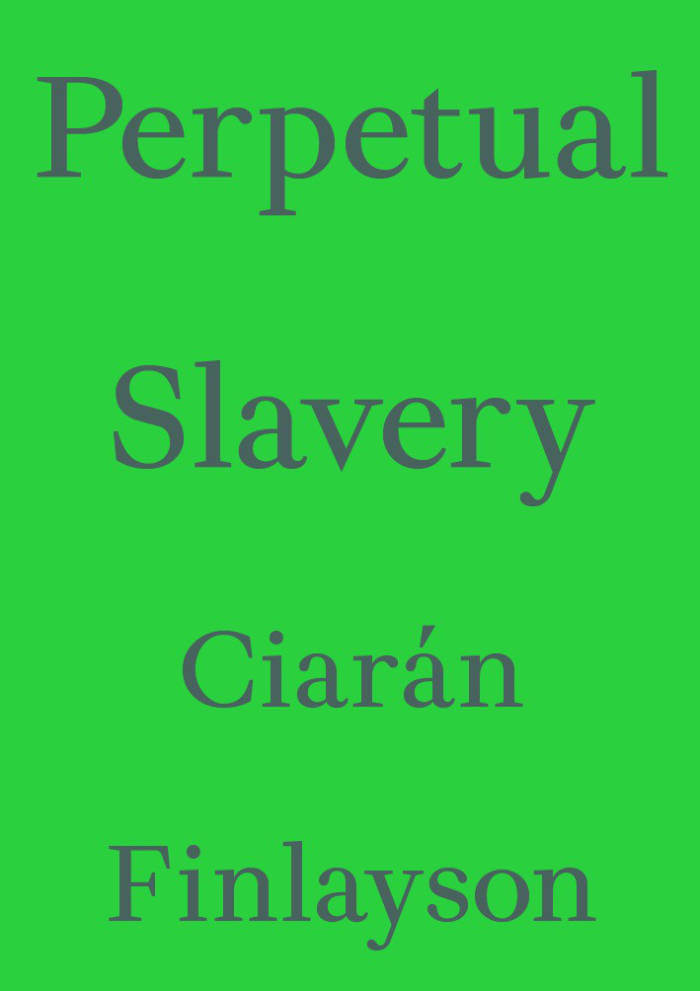
Perpetual Slavery
In Perpetual Slavery, Ciarán Finlayson investigates the relationship of art to freedom in the work of Cameron Rowland and Ralph Lemon, who both utilize imagery of labor haunted and structured by the historical experience of slavery.
Finlayson suggests that these two artists' work overcomes the dichotomy between the recording of history and its interpretation by making both the object of artistic experience, thereby providing a space to grasp the continuing effects of slavery.
Ciarán Finlayson is a writer and editor based in New York City. His essays have appeared in periodicals including Artforum, Bookforum, Papers on Language and Literature, Studio magazine, Kunst und Politik, PARSE, Archives of American Art Journal, and 032C. He is the managing editor of Blank Forms. His primary research is on contemporary art with emphases on Marxism, Black studies, philosophy of history, and conceptual art. He writes with the London-based Black Study Group and is a founding member of the political education collective Hic Rosa.

England With Eggs
Somewhere in England, confined to a room with empty chairs and an old telephone, is I. I wasn’t born here. English is their second language. They’ve given up writing. England With Eggs depicts the psychological aftermath of migration through a personal vortex of foreign experiences. Oscillating between narrator and character, Franz Kafka and long-distance calls, I spends sleepless nights drawing eggs, rearranging the chairs and talking to an uncanny voice on the phone. The isolated protagonist’s inner life is fractured: notions of place and history grow ever more fragile, language ever less certain. Torn between stubborn expectations and the reality of a foreign country, England With Eggs unfolds against a silent backdrop of austerity, colonialism and xenophobia. It is a study of acceptance, a reminder that sometimes the things we flee from are the ones we carry along on our journey.
This publication is limited to 100 copies, which are signed and numbered by the author.
Edited by Angie Harms

Fortune Teller
Sticky Fingers' Fortune Teller features wisdom from McKenzie Wark, Octavia E. Butler, Kate Zambreno, bell hooks, Clarice Lispector, Eileen Myles, Kathy Acker, Johanna Hedva, Lou Sullivan, Audre Lorde, June Jordan, and Anne Boyer.
A3, single colour risograph
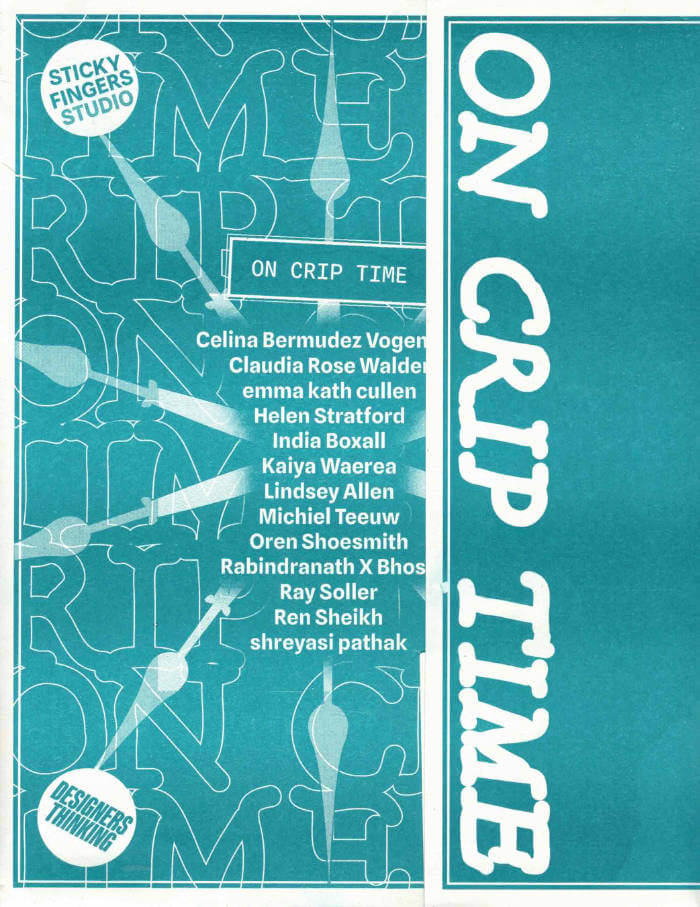
On Crip Time
This publication brings together works produced during the ‘Woke Designers Reading Club: Designing on Crip Time’ programme devised by Kaiya Waerea and Michiel Teeuw in Autumn 2022. Here we gathered to read, watch, listen and write through questions orbiting around how systems of time are enforced to prevent disabled people from accessing the future.
In this publication, you will find a range of unruly resistances. From flowcharts of lives lived and unliveable, to prayer mats, to posters, to diagrams cartographing time, to manifestos for being in a world that is built to erase us.
Designed by converger / Michiel Teeuw
Printed and finished by Sticky Fingers Studio
Featuring Celina Bermudez Vogensen, Claudia Rose Walder, emma kath cullen, Helen Stratford, India Boxall, Lindsey Allen, Michiel Teeuw, Oren Shoesmith, Rabindranath X Bhose, Ray Soller, Ren Sheikh & shreyasi pathak, with an introduction by Kaiya Waerea.
23x18cm finished size, includes an A5 24pp pamphlet, 6 A3 unbound sheets & 1 A3 wrap cover, risograph printed throughout
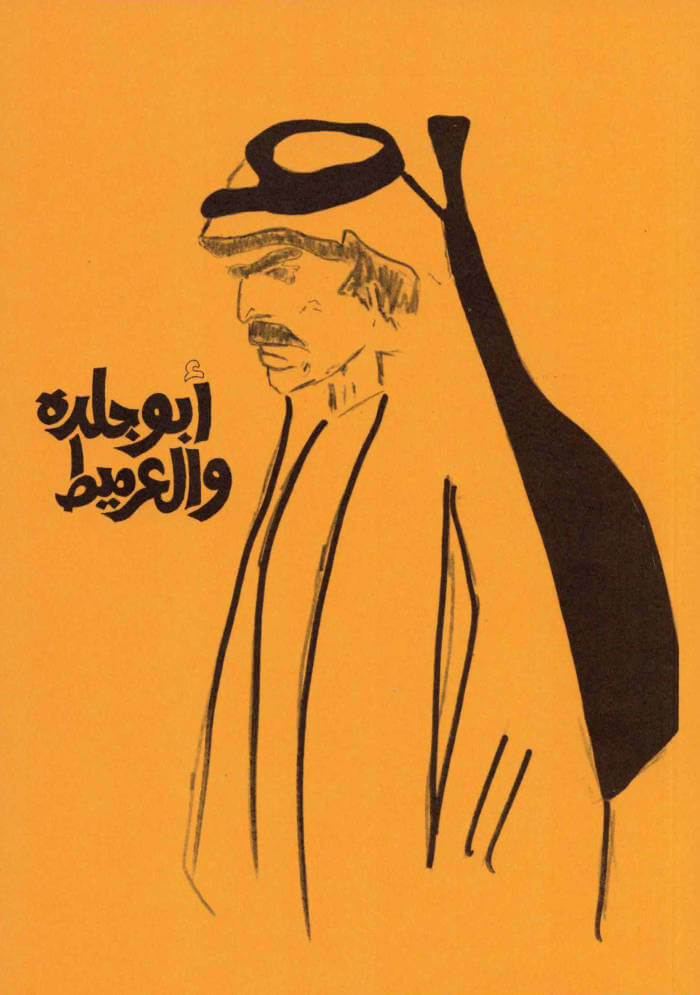
Abu Jildeh and Al-Armeet
Abu Jildeh and Al-Armeet looks at anti-colonial insurgency in Palestine through the story of the Abu Jildeh bandit gang, a group of farmers from the greater Nablus region who rose up against the British colonization of Palestine. From roughly 1931 to 1934, the band resisted both the British occupation and Palestinian feudal landlords, before they were eventually caught and executed by the British army. Their rebellion, amongst others, paved the way for the 1936 Revolt, a mass uprising against the British colonization of Palestine and the planned Zionist colonization outlined by the Balfour Declaration of 1917. Although the 1936 Revolt was ultimately crushed, it presented a formidable challenge to the British Empire. Its echoes still reverberate today.
A historical narrative unfolding through text, drawings, and archival documents, this book, first published in 2017, is now reprinted in a new edition augmented by an English-language translation.
Bilna’es (in the negative) is an a-disciplinary platform that seeks to find new models for artists to redistribute resources and support one another in the production and circulation of work. Functioning as an interdisciplinary publishing space with releases ranging from music to video games, exhibitions, publications, and yet-to-be-imagined forms. Bilna’es was initiated by Ruanne Abou-Rahme and Basel Abbas, Muqata’a, and other anonymous figures as a way to support artistic communities in Palestine and beyond.
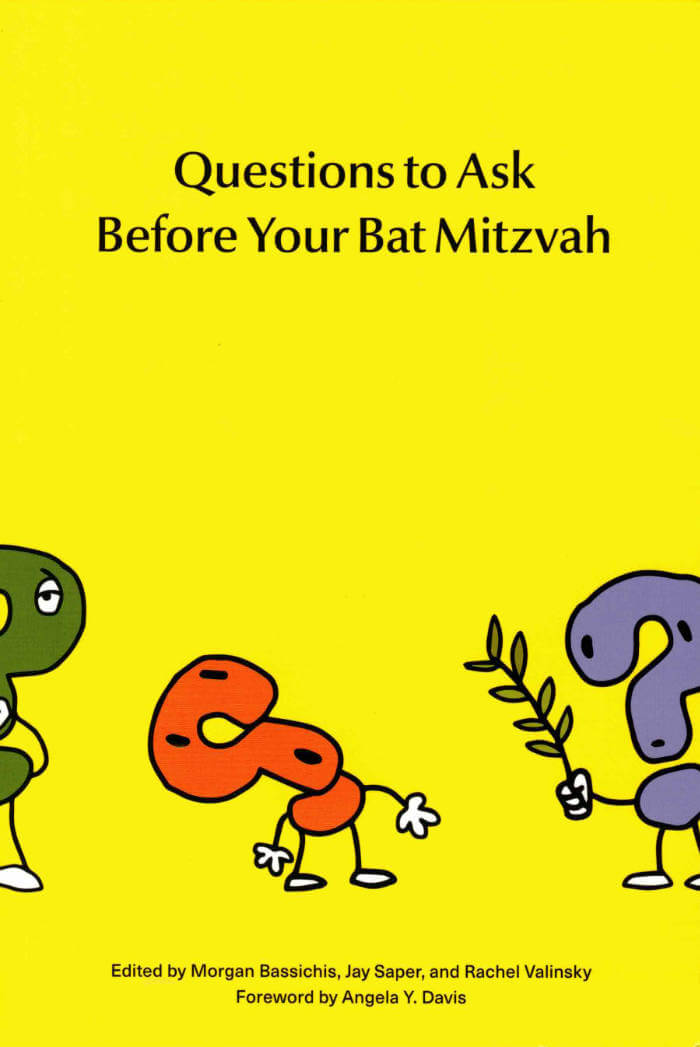
Questions to Ask Before Your Bat Mitzvah
Questions to Ask Before Your Bat Mitzvah invites 38 writers, artists, scholars, and activists to offer accessible reflections on 36 questions to help young Jews—and anyone else who picks up this book—feel grounded in the Jewish radical tradition, unlearn Zionism, and deepen their solidarity with Palestinians, offering the B’nai Mitzvah as an opportunity for political awakening open to all. Edited by comedic performance artist and activist Morgan Bassichis with artist and educator Jay Saper and writer Rachel Valinsky, with a foreword by seminal scholar-activist Angela Y. Davis, and illustrations by the artist Nicole Eisenman, this essential volume offers an accessible and challenging set of personal and collective responses to critical questions for our time.
Questions included range from “What even is a Bat Mitzvah?” and “I’m queer/nonbinary/secular/old/not even Jewish—are Bat Mitzvahs for me?” to “Why are there Israeli and American flags in my synagogue?” and “Why do people plant trees in Israel as a Bat Mitzvah gift?” and “What does the olive tree symbolize to Palestinians?” and “What does the watermelon symbolize to Palestinians?” and “What do Palestinian kids do when they turn thirteen?” and “How do I talk to my family about this stuff?”

Image RIP: After Printing, Work & Planet Earth
Image RIP, the first publication from Source Type, is centered around New York graphic designer Geoff Han’s investigation into the Shenzen-based printer Artron and explores subjects ranging from design, production, work, and the environment in the post-industrial economy. The book gathers essays by Danielle Aubert, David Bennewith, Geoff Han, Ming Lin, Shanzhai Lyric, David Reinfurt, Mindy Seu, and Dena Yago, and features images by Ann Woo. Image RIP reflects a consistent theme in Han’s practice of the manipulation of image reproduction, printing, production, code, and other techniques to affect the process of viewing and reading.

Gardener's Arms
Prose poetry looking at sonic energies, technologies, emotions and the body. Attuned to atmospheres and spaces between each other as well as the nervy dissonance between everyday speech and compositions on the page. The writing was in part developed during a sound art residency at Q-02, Brussels, Belgium.
Heavy footed, peeping
you are shadow and stone dial both
something given away reveals itself as an experiment into growth
& the doughy apology of a reversal
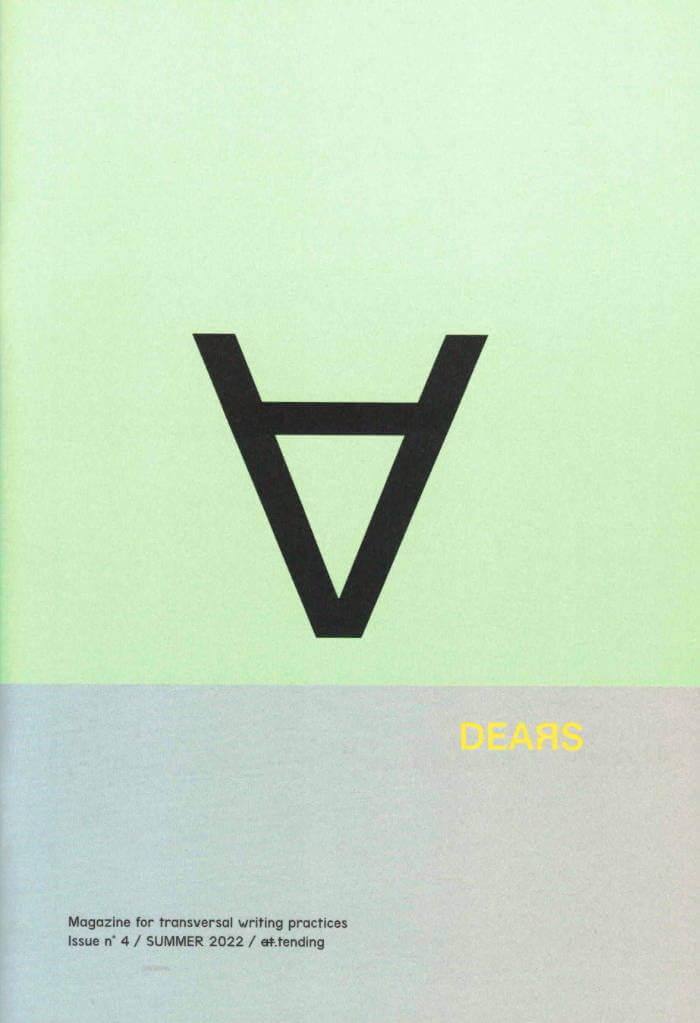
DEARS No. 4 at.tending
Robert Steinberger, Delphine Chapuis Schmitz and 1 more
DEARS is a print magazine for transversal writing practices at the crossroads of art, poetry and experimental writing. It brings together authors and writers from different backgrounds and constitutes a dedicated platform for texts escaping the usual genres and disciplinary boundaries.
DEARS promotes the exploration of new forms of language as a way to foster new forms of living together, and emphasizes the growing relevance of trans- versal writing practices in this respect.
Issue no. 4 / Summer 2022 / at.tending
With texts by Rhoda Davids Abel, Marcelline Delbecq, Egana Dzhabbarly, Camille Kaiser, Alexandra Keramidas, Marianna Maruyama, and an epigraph by Rosi Braidotti.
Editors are Delphine Chapuis Schmitz, Nicole Bachmann and Robert Steinberger.

DEARS No. 3 RE.SONATE
Robert Steinberger, Delphine Chapuis Schmitz and 1 more
DEARS is a print magazine for transversal writing practices at the crossroads of art, poetry and experimental writing. It brings together authors and writers from different backgrounds and constitutes a dedicated platform for texts escaping the usual genres and disciplinary boundaries.
DEARS promotes the exploration of new forms of language as a way to foster new forms of living together, and emphasizes the growing relevance of trans- versal writing practices in this respect.
Issue no. 3 / Winter 2021 / RE.SONATE
With texts by Meloe Gennai, Livia Johann & Anne Sylvie Henchoz, Rahel Kraft, Sanna Marander, Dominic Oppliger, Dominique Petitgand, Sarah Riggs, Cia Rinne, Axelle Stiefel & Sanna Helena Berger, Niklas Tafra, Salomé Voegelin and an epigraph by Frantz Loriot.
Editors are Delphine Chapuis Schmitz, Nicole Bachmann and Robert Steinberger

Discontent Issue 4
Reportage, new writing, photography and art from Palestine, Lebanon and Egypt.
Contributors include Adam Rouhana, Ashraf Hamideh, Dalia Abuzeid, Fadi BouKaram, Farah-Silvana Kanaan, Hazem Jamjoum, Lama Rabah, Malak Mattar, Nadine Abdellatif, Rewa Zeinati, Salah Daoud, Zahra Hankir, and Zeina Abuzaid.

First Floor Vol 1: Reflections on Electronic Music Culture
Written by veteran journalist Shawn Reynaldo, First Floor is a weekly newsletter that focuses on electronic music, along with the culture and industry that surround it. Over the course of just a few years, it’s become one of electronic music’s most influential platforms, routinely putting many of the genre’s thorniest issues under the microscope while reckoning with changes in the culture during a time of profound transformation.
A collection of Reynaldo’s most thought-provoking essays, First Floor Volume 1 provides a nuanced, wide-ranging look at contemporary electronic music culture, with a particular focus on systemic issues that often go undiscussed.
Topics covered included the evolving nature of electronic music fandom and artistry, value shifts brought on by the current changing of the generational guard, the shortcomings of the modern music press and the growing gap between electronic music’s foundational rhetoric and the genre’s present-day norms.
Incorporating both pieces originally published in the newsletter (all of which have been updated) and exclusive new material from Reynaldo himself, the book also features a foreword by veteran artist and 3024 label founder Martyn.
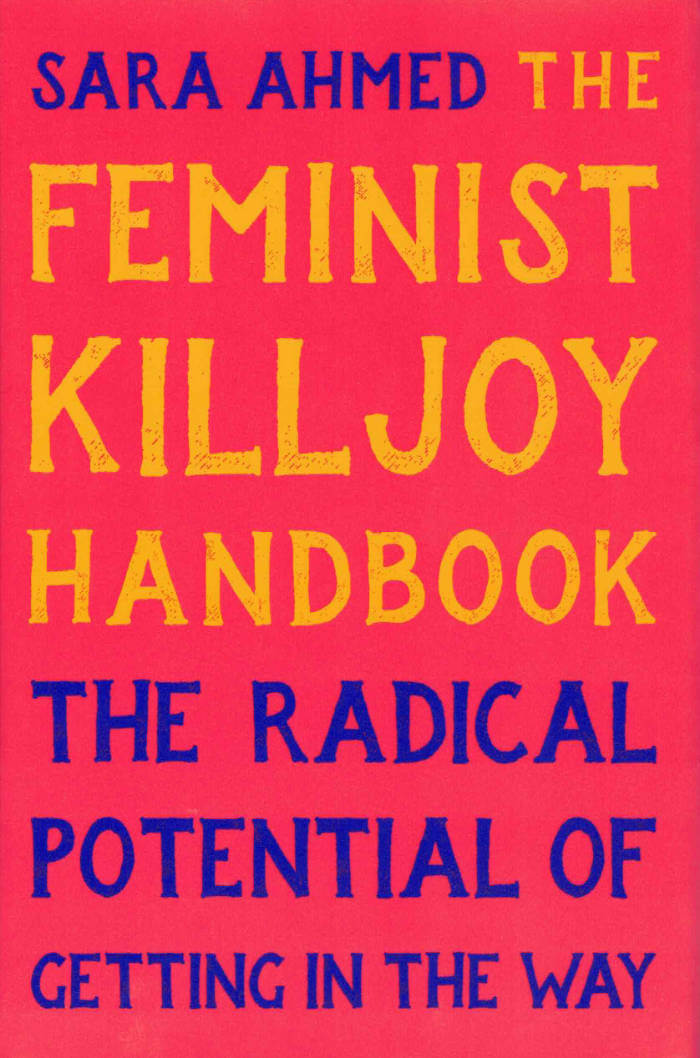
The Feminist Killjoy Handbook: The Radical Potential of Getting in the Way
A renowned feminist thinker argues we need to get in the way of happiness, our own and other people’s, to build a more just world
Do you refuse to laugh at offensive jokes? Have you ever been accused of ruining dinner by pointing out your companion’s sexist comment? Are you often told to stop being so “woke”? If so, you might be a feminist killjoy—and this handbook is for you. In this book, feminist theorist Sara Ahmed shows how killing joy can be a radical world-making project.
Presenting sharp analysis of literature, film, and influential feminist works, and drawing on her own experiences as a queer feminist scholar-activist of color, Ahmed reveals the invaluable lessons of the feminist killjoy, from the importance of asking questions to the power of the eye roll. The Feminist Killjoy Handbook offers an outstretched hand to feminist killjoys everywhere and an essential intellectual guide to the transformative power of getting in the way.

(Home Works) – A Cooking Book
Jens Strandberg, Jenny Richards
Home Works – A Cooking Book: Recipes for Organising with Art and Domestic Work, expands on cooking with art and food as a process for coming together and building collectivity. The book highlights the art and politics of eating together through a number of artistic, curatorial and tasty dinner recipes. Recipes that nourish and nurture conversations around domestic labour, collaborative practices and feminist politics, expanded upon through a series of essays and interviews.
The recipes were learnt during the cooking of Home Works; a research and exhibition programme investigating domestic labour and the politics of the home, hosted by the art space Konsthall C in Stockholm 2015-2017.
Home Works – A Cooking Book is a tool for everyone that wants to use art to challenge what work we value and how work is organised.
With contributions by: Samira Ariadad, Jonna Bornemark, Marie Ehrenbåge, Silvia Federici, Sandi Hilal, Dady de Maximo, Temi Odumosu, Jenny Richards and Jens Strandberg, Khasrow Hamid Othman, Halla Þórlaug Óskarsdóttir.

Poësy Matters and Other Matters (2 vol.)
The first comprehensive publication of the Swedish polymath Catherine Christer Hennix's written work in a two-volume set.
Volume one, Poësy Matters, is divided into two sections: poetry and drama, with each section also containing pieces of commentary by Hennix or her longtime collaborator Henry Flynt. Volume two, Other Matters, is divided into two sections: first, program notes and essays about a wide range of topics (including music, psychoanalysis, and mathematics), and second, a reproduction of Hennix's 1989 work The Yellow Book. The first comprehensive publication of Hennix's written work, Poësy Matters and Other Matters illustrates the singular depth and variety of her contributions to contemporary music, art, literature, and mathematics.
The texts in Poësy Matters and Other Matters reflect Hennix's diverse training as well as her long-standing personal interests in Lacanian psychoanalysis and Japanese and Middle Eastern poetic forms, resulting in a rich, diffuse collection of writings that reveal one of the avant-garde's most implacable, not to mention overlooked, creative minds.
Best known as a composer, Catherine Christer Hennix (1948, Stockholm – 2023, Istanbul) has, throughout her fifty-plus-year career, produced innovative work in the fields of not just minimal and computer music, but psychoanalytic theory, intuitionist mathematics, poetry, and prose as well.
Edited and introduced by Lawrence Kumpf.
English edition
17 x 24 cm (2 individual books, packaged together)
311 + 448 pages (ill.)
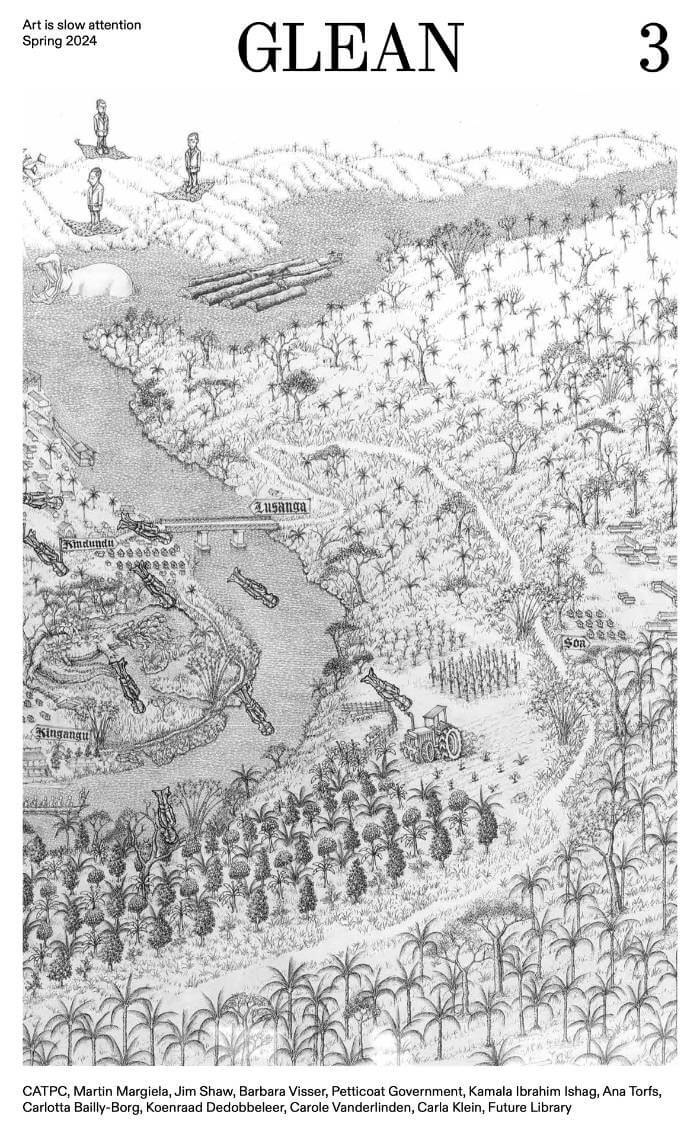
GLEAN - Issue 3 (ENG edition)
The third issue of English edition of GLEAN magazine.
With CATPC, Martin Margiela, Jim Shaw, Barbara Visser, Petticoat Government, Kamala Ibrahim Ishag, Ana Torfs, Carlotta Bailly-Borg, Koenraad Dedobbeleer, Carole Vanderlinen, Carla Klein, Future Library.

Time has fallen asleep in the afternoon sunshine
Appendix #1: The gesture of writing
Victoria Pérez Royo, Léa Poiré and 1 more
The Appendixes #1-4 is an editorial series by Mette Edvardsen, Léa Poiré and Victoria Pérez Royo that came out of the project Time has fallen asleep in the afternoon sunshine. For a two-year residency at Les Laboratoires d'Aubervilliers (2022-23), they came together as a small work group, shaping the work process, hosting presentation formats and making the publication series on paper as four cahiers.
The cahiers comprise a collection of commissioned texts and contributions created for this context, selected documents and traces from work sessions and encounters organized during the residency, texts read together and republished for this occasion, a collection of references, notes in progress, unfinished thoughts and loose fragments - on paper, between pages.
p 5-7 Almost on my way to you
p 8-10 Presque en route vers toi
Laía Argüelles Folch
p 12-13 Exercise in translation of Breve ensayo sobre la carta (Brief essay on the letter) by Laía Argüelles Folch
p 14-15 Exercice de traduction de Breve ensayo sobre la carta (Bref essai sur la lettre) de Laía Argüelles Folch
Quim Pujol, Paula Caspão, Simon Asencio, Pascal Poyet, Mette Edvardsen, Léa Poiré, Victoria Pérez Royo & Laía Argüelles Folch
p 16-17 Like a dinosaur upon awakening
p 18-19 Comme un dinosaure au réveil
Pascal Poyet
p 20-23 Is she a translator?
p 24-27 Est-elle traductrice?
Olivia Fairweather
p 28-29 New edition revised by my author
p 30-31 Nouvelle édition revue par mon auteur
Léa Poiré
p 32 Notes from a translation in progress
p 33 Notes d'une traduction en cours
Kate Briggs
p 34-37 Mothers & tongues
p 38-41 Langues (maternelles)
Mette Edvardsen
p 42-43 Collective reading of Finnegans Wake by James Joyce
p 44-45 Lecture collective de Finnegans Wake de James Joyce
Dora García and readers, et les lecteur·rices
p 46-49 Notes for a talk that did not happen
p 50-53 Notes pour une conférence qui n'a pas eu lieu
Olivia Fairweather
p 54-65 Meticulous comparison of two books with their versions rewritten from memory, excerpts from a work document
Comparaison méticuleuse de deux livres avec leurs versions réécrites de mémoire, extraits d'un document de travail
Julián Pacomio & Ángela Millano

Time has fallen asleep in the afternoon sunshine
Appendix / Appendice #4: Translation / Traduction
Mette Edvardsen, Léa Poiré and 1 more
The Appendixes #1-4 is an editorial series by Mette Edvardsen, Léa Poiré and Victoria Pérez Royo that came out of the project Time has fallen asleep in the afternoon sunshine. For a two-year residency at Les Laboratoires d'Aubervilliers (2022-23), they came together as a small work group, shaping the work process, hosting presentation formats and making the publication series on paper as four cahiers.
The cahiers comprise a collection of commissioned texts and contributions created for this context, selected documents and traces from work sessions and encounters organized during the residency, texts read together and republished for this occasion, a collection of references, notes in progress, unfinished thoughts and loose fragments - on paper, between pages.